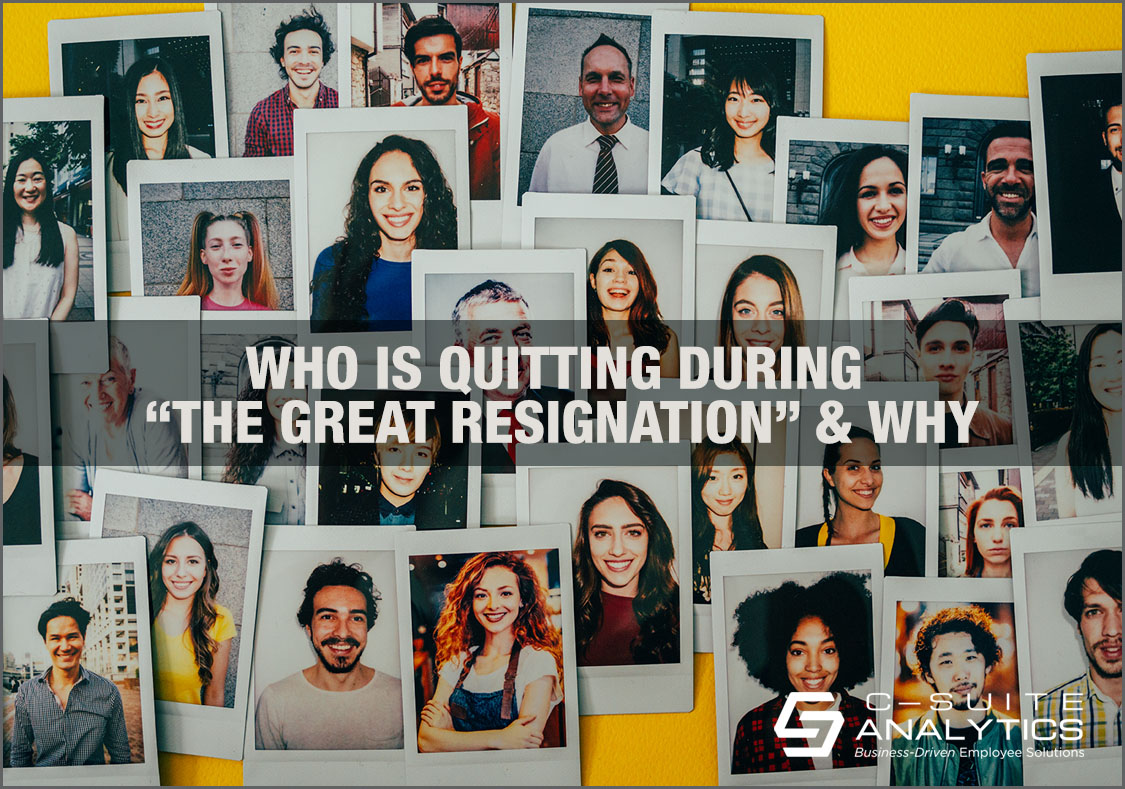According to the National Education Association, a full 600,000 teachers have already left teaching since January 2020, and a recent NEA poll indicated 55% more will quit prematurely. So, teachers are fast becoming a very talented recruiting pool.
Who Is Quitting During “The Great Resignation” and Why

PBS News released a new study last week and here are the top 4 nuggets:[i]
- 38% of U.S. adults who are working said they changed jobs in the last 2 years, up from 32% in a pre-pandemic poll.
Recall that the BLS projects just short of 35% of the same group will quit their jobs this year alone, so the PBS study omits those who have quit and stayed quit which is a large chunk. The data nonetheless indicates more people are changing jobs than in the past…not really news though to our regular readers.
- More lower-paid workers quit for other jobs.
Almost half of those who make less than $75,000 per year said they quit for other jobs, whereas just one-third who make above that mark said the same thing.
- Young workers were more likely to quit and change jobs, too.
Those under age 45 were twice as likely to quit, and gen Z and millennials were the most frequent quitters.
This aligns with data I presented earlier here regarding the average length of service with one organization by generation:
- Baby boomers 8 years 3 months
- Millennials 2 years 9 months
- Gen Z 2 years 3 months
This reads like the same-old “young people are less loyal” talk until one digs deeper to find millennials and gen Z now comprise 51% of our workforce…and they are increasing by the day. Complaining and “working around them” no longer applies because they now have the upper hand.
Digging Deeper Into “The Great Resignation” Quits
And now we get to the good stuff…
- The main reason workers quit and changed jobs was because of pay…sort of.
Fifteen percent of men said they changed jobs because of pay whereas 7% of women said the same. The survey tells us the leading reason why women quit jobs was “better opportunity”. So let’s flip the above and say this:
“85% of men and 93% of women quit for reasons other than pay.”
The study goes onto tell us other quit reasons were reduction in hours or benefits, options to work remotely or for more flexible hours, relocation, lost their jobs, and of course the old standard, “better opportunity”.
What “The Great Resignation” Data Tells Me
My thoughts are…
- Pay was clearly not a dominant quit reason so why indicate that it is? To gain more readers?
- “Better opportunity” is the trashcan of employee leave reasons, usually the leading reason found in companies’ exit interview data…and it’s worthlessly vague as it doesn’t specify a reason and gives us no path to solutions.
- As just one example, solutions could be built on the precise percentages of who have left due to wanting remote work but the study didn’t tell us those details.
Months ago I presented the results of MIT’s similar study regarding why workers are quitting during “The Great Resignation”. That study cited “toxic corporate culture” as the top reason and pay as reason #16. My first intrigue was how can there be 14 separate leave reasons between those two reasons so I wrote to the authors who have never written back.
Neither study gives many details and I wish they did. But there is nonetheless a punchline that cannot be avoided:
There are so many leave reasons and so many personalized ones that no one-size-fits-all program will fix them. Not pay, not benefits, not work-from-home, not any traditional solution program.
I read in another study that employees are leaving due to too much work because their companies are understaffed due to too much turnover. How’s that for a conundrum?
What do I Believe is the Real Reason for “The Great Resignation” Quits?
We need a “Hey, wake-up!” wake-up call regarding the real reasons employees leave…and how to identify real retention solutions. All of the data above indicates pay is just one of many, many reasons why employees are quitting…and likely not even the main one. Yet companies have shown a willingness to increase pay more than in the past, to dig into their budgets to do so…and increased inflation in the process.
Have hope. The real solution is Stay Interviews. Tell your leaders on all levels they are accountable for a retention goal, teach them 4 specific skills and 5 specific questions, and expect them to build individualized retention solutions. We recently listed our retention success for tough-industry jobs during “The Great Resignation”and here’s want we found:
- Waste Connections, collecting & sorting trash…turnover down 30%.
- Wayne Farms, “processing” chickens…turnover down as high as 50%
- Covenant Health with 3 hospitals and 10 post-acute centers…turnover down 22%.
- AdventHealth…post-acute center turnover down 43%, cut agency costs to zero.
- Quest Diagnostics…turnover down 45% prompting NBC News to broadcast a special report of our success with them
You Can Cut Turnover by 20% or More, Even During The Great Resignation
Schedule a conversation with me at DFinnegan@C-SuiteAnalytics.com to discuss your employee retention roadblocks and I’ll share ideas for how you can move forward and what is working for other companies to cut turnover by 20% and more, even during The Great Resignation that may benefit you.
[i] https://www.pbs.org/newshour/economy/1-in-3-americans-who-switched-jobs-during-the-great-resignation-say-they-did-it-for-better-pay



